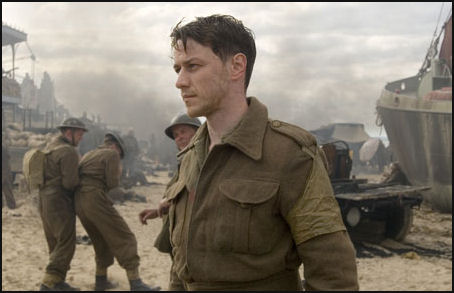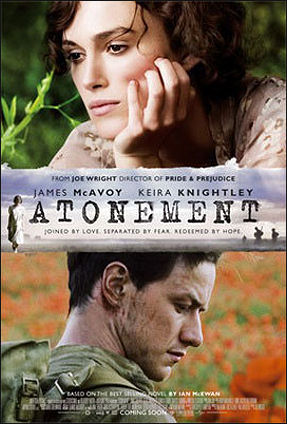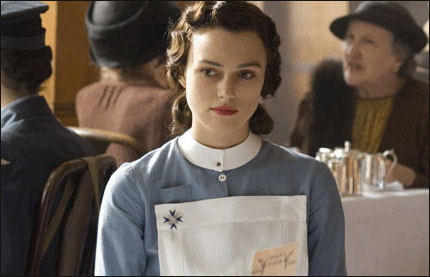You can absolutely confirm and take to the bank all serious notions of Joe Wright‘s Atonement (Focus Features, 10.12) being a top-ranked Best Picture contender. It’s a shatteringly well-made, deeply felt, rich-aroma romance that will go all the way with (almost all) critics, Academy voters and public alike.

Wright has totally pole-vaulted himself past the level of Pride and Prejudice (a well-made Jane Austen-er that I was only okay with) and taken costars Keira Knightley, James McAvoy and especially Vanessa Redgrave (a locked Best Supporting Actress contender) right along with him.
You can add Focus Features and everyone else associated with Atonement (young Irish actress Saoirse Ronanas, cinematographer Seamus McGarvey, production designers Jacqueline Durran and Sarah Greenwood) as well. Everybody wins with this film, the audience first and foremost.
This is one of those bulls-eye period dramas that feels wonderfully sharp and literate and authentic with emotional tone-perfect performances, and yet the profundity of the payoff is in the way it combines cinematography, editing and sound effects (not to mention one of the most enjoyably splendid uncut Steadicam shots in cinema history — the kind that warrants applause in and of itself) to create a sort of cinematic maelstrom effect.

Atonement leaves you with a sense of great regret and sadness (the feel-good kind) that amounts to something much deeper and fuller than what may be suggested by a casual reading of the plotline — a tale about a woman writer crushed by profound guilt over a harmful thing she did as a youth, caused by foolishness that was amplified by sexual panic. Atonement taps into feelings of regret about all things, about how sadly transitional and here-today-gone-tomorrow so much of life is, and injects them into your system like it came from a syringe.
I’m sorry for having suspected that Variety’s Derek Elley was perhaps being just a tad gung-ho-Britain in his Venice Film Festival review (he wasn’t), I now feel that a piece I wrote two years ago about Knightley not having “it” is out of date (Atonement shows that she’s found it and then some since, and without resorting to any of her old tricks) , and I’m sorry for having taken a cheap shot at McAvoy also. I’ve seen the light and am trying to make up as best I can.
Based upon an Ian McEwan novel published in ’01, Wright’s incredibly well-configured adaptation may not entangle younger males as much as other demos, but it’s an absolute slam dunk with mature viewers, couples and over-30 women.

It feels wrong to describe Atonement as a film with three acts, although it is that, because it doesn’t feel defined by “acts” as much as the way Wright has cut it all together, and I mean with not only dazzle but ultra-fine precision. It replays or refrains certain scenes and does flash-forwards and flashbacks with impugnity, and never once does it feel gimmicky for doing so. It all fits together and hums like Swiss machinery.
I can write more about it down the road, including the plot particulars. I have to get to another screening, and I’m late as it is. There’s no getting to even half of what you’d like to get to at this festival. So much of it is about curses and lost opportunities. I love it, of course.
I’m not saying Atonement is necessarily “the one” (I’m hardly in a position to say anything like that), but unless I’m crazy it will almost certainly end up as one of the five Best Picture nominees. And hail to the great Vanessa Redgrave once again. She’s on-screen at the very end for maybe six or seven minutes (perhaps a touch more), and does nothing except talk to an off-screen interviewer, and she hits an absolute grand slam.









